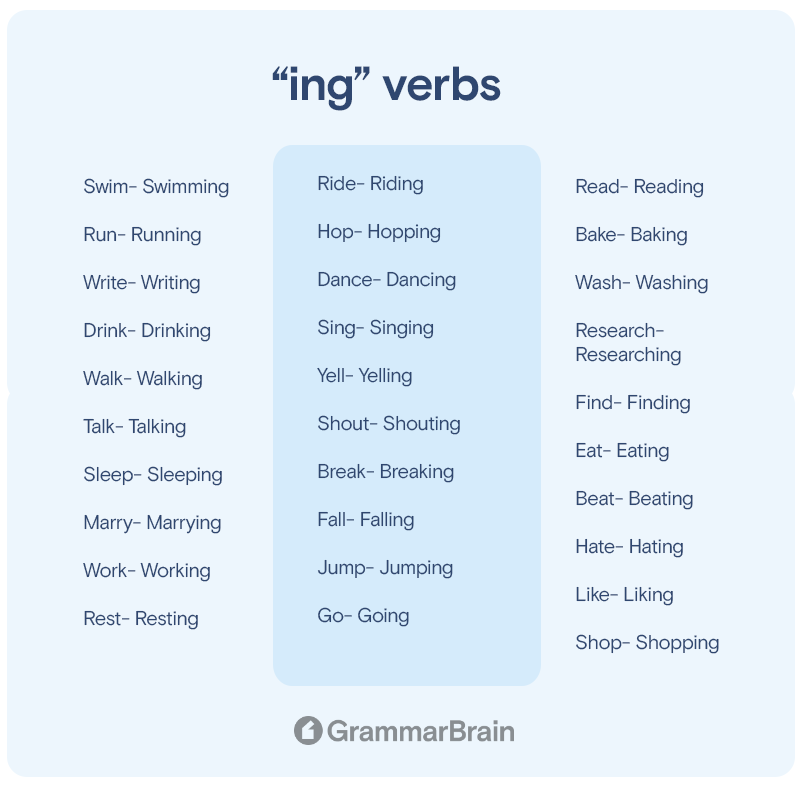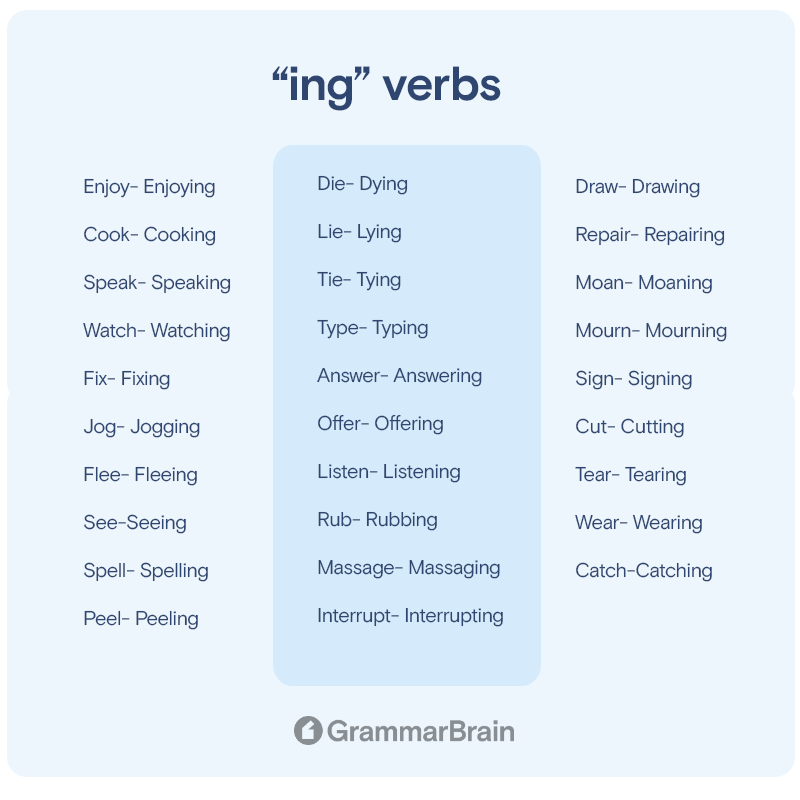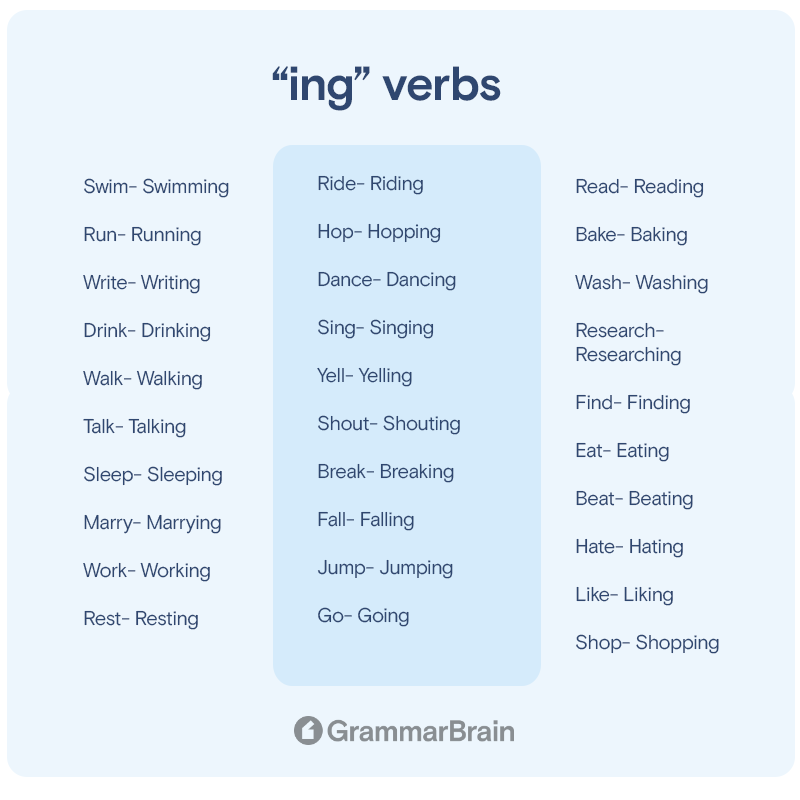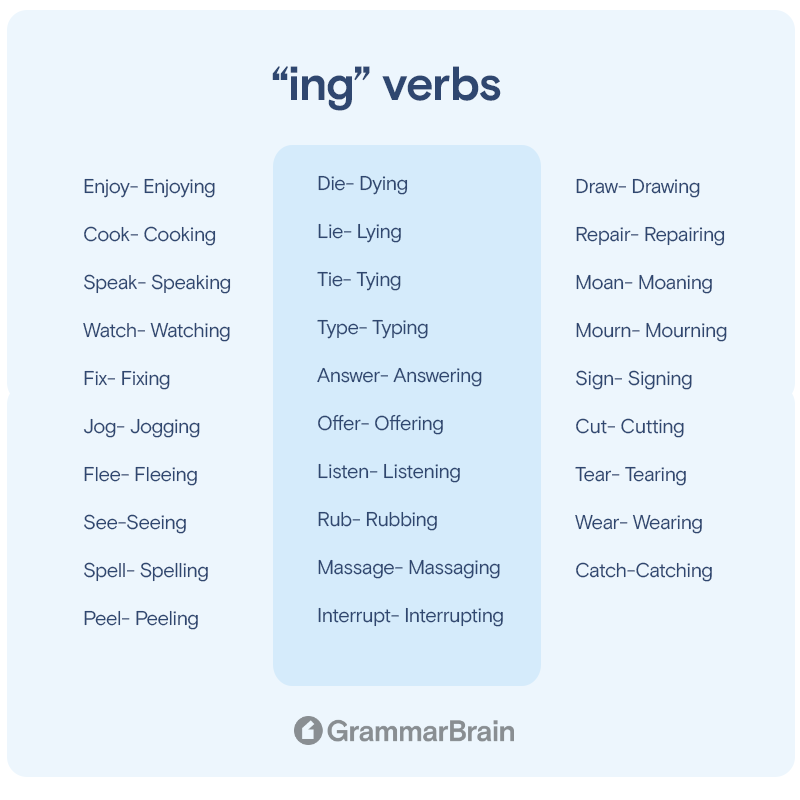What are common “ing” verbs? Before we dive into the list of words (or verbs) that end in “ing,” understanding the meaning of the two words is the first necessity. What does “ing” mean? What does it denote? Why are they added to verbs?
What are verbs? And “ing” verbs?
First, it’s crucial to understand what verbs are. To put it simply, verbs are words that show action. Any word which denotes an action is called a verb. Some examples of verbs are run, swim, sleep, talk, walk, etc.
These words show that an object is doing something. They are either running, swimming, going for a walk, etc. They tell us about the current state or the action that the object is performing. Verbs are an essential part of many languages that exist around the world.
However, some verbs can get confusing because they also act as a noun.
Some examples include:
- Bat: Bat is a type of animal, but it is also an act of hitting a ball when playing a game
- Fish: Fish are animals, and at the same time, it also refers to the activity of hunting fish (to fish).

What does adding the suffix “ing” mean?
“Ing” is a popular suffix added after nouns and verbs. When added to a verb, “ing” is often used to form a present participle of the verb. It is also used to show an instance of a process or an action. Some examples of verbs ending in ing are:
- Running, Swimming, Walking, Talking, Sleeping.
These words now show that the object is in the process of doing an action. The most important thing to remember here is that “ing” transforms the verb into a “present participle” form.

List of common verbs ending in “ing”
Now that we have an understanding of the two words and why they are used, let’s look at a list of verbs ending in “ing”:
Swim- Swimming
Run- Running
Write- Writing
Drink- Drinking
Walk- Walking
Talk- Talking
Sleep- Sleeping
Marry- Marrying
Work- Working
Rest- Resting
Hunt- Hunting
Bowl- Bowling
Play- Playing
Sit- Sitting
Smoke-Smoking
Ride- Riding
Hop- Hopping
Dance- Dancing
Sing- Singing
Yell- Yelling
Shout- Shouting
Break- Breaking
Fall- Falling
Jump- Jumping
Go- Going
Leave- Leaving
Tease- Teasing
Read- Reading
Bake- Baking
Wash- Washing
Research- Researching
Find- Finding
Eat- Eating
Beat- Beating
Hate- Hating
Like- Liking
Shop- Shopping
Enjoy- Enjoying
Cook- Cooking
Speak- Speaking
Watch- Watching
Fix- Fixing
Jog- Jogging
Flee- Fleeing
See-Seeing
Spell- Spelling
Peel- Peeling
Fly- Flying
Die- Dying
Lie- Lying
Tie- Tying
Type- Typing
Answer- Answering
Offer- Offering
Listen- Listening
Rub- Rubbing
Massage- Massaging
Interrupt- Interrupting
Guess- Guessing
Clean- Cleaning
Paint- Painting
Draw- Drawing
Repair- Repairing
Moan- Moaning
Mourn- Mourning
Sign- Signing
Cut- Cutting
Tear- Tearing
Wear- Wearing
Catch-Catching
Tap- Tapping
Stroke- Stroking
Meet- Meeting
Sink- Sinking
Grow- Growing
Win- Winning
Gamble- Gambling
Paint- Painting
“ing” verbs list (images)


FAQs
Why is “ing” added to the end of a verb?
When added to the end of a verb, “ing” transforms the verb form into a present participle. This shows that the action is currently under process, or to put it simply, that the object is currently performing that action.
How do you show that an action has been completed?
Like “ing” shows that an action is being performed or “is in process.” It needs to be transformed into a past participle form to show that it has been completed. This is shown by using a past form of the verb. Different verbs can have different past participle forms. For instance: Swim- Swam, Walk: Walked, Run- Ran, etc.
Why are verbs important?
Verbs are an essential part of the English language. This is because they show action. When an object is performing some act, it is denoted by a verb.
Verbs are also an integral part of other languages worldwide for the same reason.
Sources
- Collins: Definition of “Ing”
- Cambridge Dictionary: Verb Patterns
- Collins: Which verbs are followed by “ing” form in English
- Walden University: Verb Forms: “ing”
Inside this article
Fact checked:
Content is rigorously reviewed by a team of qualified and experienced fact checkers. Fact checkers review articles for factual accuracy, relevance, and timeliness. Learn more.
Core lessons
Glossary
- Abstract Noun
- Accusative Case
- Anecdote
- Antonym
- Active Sentence
- Adverb
- Adjective
- Allegory
- Alliteration
- Adjective Clause
- Adjective Phrase
- Ampersand
- Anastrophe
- Adverbial Clause
- Appositive Phrase
- Base Form
- Body Paragraph
- Clause
- Compound Adjective
- Complex Sentence
- Compound Words
- Compound Predicate
- Common Noun
- Comparative Adjective
- Comparative and Superlative
- Compound Noun
- Compound Subject
- Compound Sentence
- Copular Verb
- Collective Noun
- Colloquialism
- Conciseness
- Consonance
- Conditional
- Concrete Noun
- Conjunction
- Conjugation
- Conditional Sentence
- Comma Splice
- Correlative Conjunction
- Coordinating Conjunction
- Coordinate Adjective
- Cumulative Adjective
- Dative Case
- Determiner
- Declarative Sentence
- Declarative Statement
- Direct Object Pronoun
- Direct Object
- Diction
- Diphthong
- Dangling Modifier
- Demonstrative Pronoun
- Demonstrative Adjective
- Direct Characterization
- Definite Article
- Doublespeak
- Equivocation Fallacy
- En Dash
- False Dilemma Fallacy
- Future Perfect Progressive
- Future Simple
- Future Perfect Continuous
- Future Perfect
- First Conditional
- Gerund
- Gerund Phrase
- Genitive Case
- Homophone
- Homonym
- Helping Verb
- Irregular Adjective
- Irregular Verb
- Imperative Sentence
- Indefinite Article
- Intransitive Verb
- Introductory Phrase
- Indefinite Pronoun
- Indirect Characterization
- Interrogative Sentence
- Intensive Pronoun
- Inanimate Object
- Indefinite Tense
- Infinitive Phrase
- Interjection
- Intensifier
- Infinitive
- Indicative Mood
- Juxtaposition
- Linking Verb
- Modal Verb
- Modifier
- Misplaced Modifier
- Nominative Case
- Noun
- Noun Adjective
- Oxymoron
- Object Pronoun
- Object Complement
- Order of Adjectives
- Participle
- Parallelism
- Prepositional Phrase
- Past Simple Tense
- Past Continuous Tense
- Past Perfect Tense
- Past Progressive Tense
- Present Simple Tense
- Present Perfect Tense
- Personal Pronoun
- Personification
- Persuasive Writing
- Parallel Structure
- Phrasal Verb
- Predicate Adjective
- Predicate Nominative
- Phonetic Language
- Plural Noun
- Punctuation
- Punctuation Marks
- Preposition
- Preposition of Place
- Parts of Speech
- Possessive Adjective
- Possessive Determiner
- Possessive Case
- Possessive Noun
- Proper Adjective
- Proper Noun
- Present Participle
- Prefix
- Predicate
- Quotation Marks
- Relative Pronoun
- Reflexive Pronoun
- Reciprocal Pronoun
- Subordinating Conjunction
- Simple Future Tense
- Syntax
- Stative Verb
- Subjunctive
- Subject Complement
- Subject of a Sentence
- Sentence Variety
- Second Conditional
- Suffix
- Superlative Adjective
- Slash Symbol
- Topic Sentence
- Types of Nouns
- Types of Sentences
- Uncountable Noun
- Verb
- Verb Tense
- Vowels and Consonants



